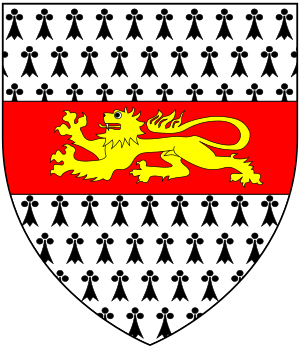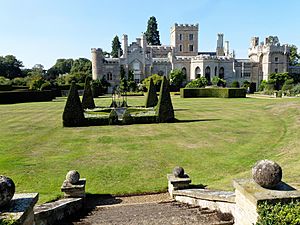John Proby, 1st Earl of Carysfort facts for kids
Quick facts for kids
The Earl of Carysfort
|
|
|---|---|

Arms of Proby: Ermine, on a fess gules a lion passant or
|
|
| Joint Master of the Rolls in Ireland (with the Earl of Glandore) | |
| In office 1789–1801 |
|
| Monarch | George III |
| Preceded by | The Duke of Leinster |
| Succeeded by | Michael Smith |
| Joint Postmaster General (with the Earl of Buckinghamshire) |
|
| In office 1806–1807 |
|
| Monarch | George III |
| Prime Minister | The Lord Grenville |
| Preceded by | The Duke of Montrose Lord Charles Spencer |
| Succeeded by | The Earl of Chichester The Earl of Sandwich |
| Personal details | |
| Born | 12 August 1751 |
| Died | April 7, 1828 (aged 76) Upper Grosvenor Street, London |
| Nationality | British |
| Political party | Whig |
| Spouses | (1) Elizabeth Osborne (d. 1783) (2) Elizabeth Grenville (1756-1842) |
| Alma mater | Trinity College, Cambridge |
John Joshua Proby, the 1st Earl of Carysfort (born August 12, 1751 – died April 7, 1828), was an important British figure. He was a judge, a diplomat who represented his country, a politician from the Whig party, and even a poet. He held several important roles during his life, including a judge in Ireland and a Postmaster General in the United Kingdom.
Contents
Early Life and Education
John Joshua Proby was the son of John Proby, who was the 1st Baron Carysfort. His mother was Elizabeth, whose father was Joshua Allen, the 2nd Viscount Allen.
He received a good education, which was common for people of his background. He attended Westminster School, a famous school in London. After that, he went to Trinity College, Cambridge, one of the top universities in England.
Political and Judicial Career
In 1772, John Joshua Proby became the second Baron Carysfort after his father passed away. This meant he inherited his father's title and some responsibilities.
In 1779, he was chosen to be a Fellow of the Royal Society. This is a special honor for people who have done important work in science. A few years later, in 1784, he was made a Knight of the Order of St Patrick. This is a very high award given in Ireland.
Roles in Ireland
In 1789, he joined the Irish Privy Council. This was a group of important advisors to the King in Ireland. In the same year, he was given the title of Earl of Carysfort in the Peerage of Ireland. This was a higher noble title.
He was also appointed as a Joint Master of the Rolls in Ireland. This was a judicial role, meaning he was involved in legal matters. He held this position until 1801. At that time, this job was often seen as a "sinecure," which means it was a position that paid well but didn't require much actual work.
Serving in Parliament
In February 1790, he became a member of the British House of Commons, representing the area of East Looe. He held this seat for a few months. Then, from June 1790 until 1801, he represented Stamford in Parliament.
From 1800 to 1802, he also served as an Envoy to Berlin. This meant he was a diplomat, representing Britain in the city of Berlin. In 1793, he was appointed a deputy lieutenant for Northamptonshire, helping with local government duties.
Later Political Positions
In 1801, he received another important title: Baron Carysfort in the Peerage of the United Kingdom. This new title gave him a seat in the House of Lords, which is the upper house of the British Parliament.
He also worked as a Commissioner for the President of the Board of Control. This board helped manage affairs in British India. From 1806 to 1807, he served as a Joint United Kingdom Postmaster General. This role was in charge of the postal service. He was sworn into the British Privy Council in 1806, becoming an important advisor to the King in Britain.
A Poet's Life
Besides his political and judicial work, Lord Carysfort also had a creative side. In 1810, he published a book of his own writings called Dramatic and Narrative Poems. This shows he was interested in literature and enjoyed writing.
Family Life
Lord Carysfort lived at Elton Hall in Huntingdonshire. He inherited this large home from his father.
He was married twice. His first wife was Elizabeth Osbourne, whom he married in 1774. They had three sons and one daughter together. Sadly, Elizabeth passed away in 1783.
In 1787, he married his second wife, Elizabeth Grenville. She was the daughter of George Grenville, who had been a Prime Minister. John and Elizabeth had three daughters.
Lord Carysfort passed away in April 1828 when he was 76 years old. His oldest son, William, had died before him. So, his second son, John, inherited his titles and became the 2nd Earl of Carysfort. Lady Carysfort, his second wife, lived until December 1842.
Images for kids
 | Percy Lavon Julian |
 | Katherine Johnson |
 | George Washington Carver |
 | Annie Easley |



